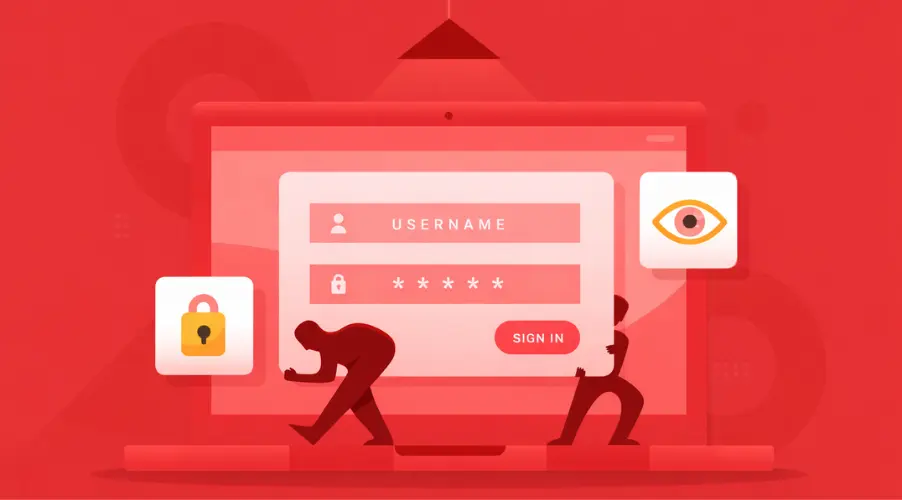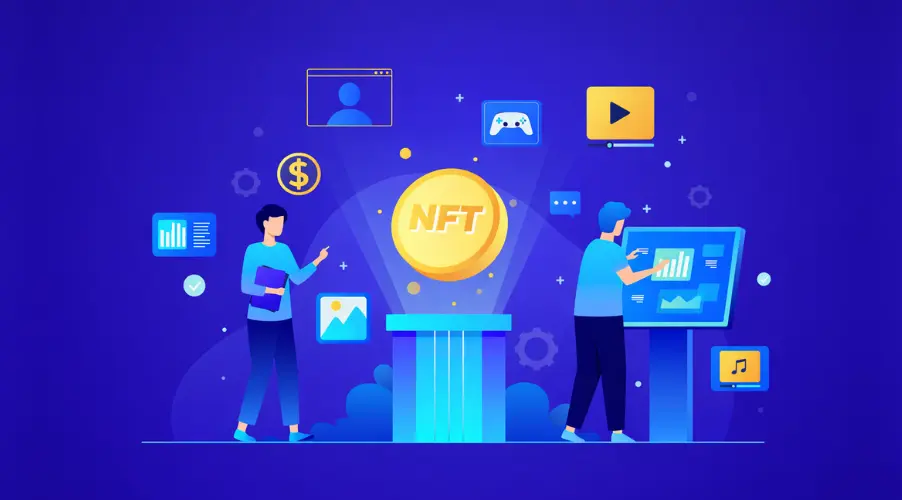Key Takeaways
- Zero-Knowledge Technology enables proving statements are true without revealing the underlying information, fundamental for privacy and scalability in Web3
- Zero-Knowledge Proofs (ZKP) power both privacy applications (hiding transaction details) and scaling solutions (validating batched transactions efficiently)
- zk-SNARKs offer small proofs with trusted setup, while zk-STARKs provide trustless, quantum-resistant proofs with larger sizes
- ZK-Enabled Web3 Platforms like zkSync, StarkNet, and Polygon zkEVM reduce Ethereum gas fees by 10-100x through ZK-Rollups
- zk-Cryptography enables enterprise ZK compliance by proving regulatory requirements are met without exposing sensitive customer data
- ZK Privacy Protocols power confidential DeFi, secure identity verification, and private governance voting systems [1]
- Zero-Knowledge SDKs and ZK-Driven dApp Frameworks are maturing, making ZK implementation more accessible for builders
- ZK-EVM Infrastructure brings Ethereum compatibility to ZK scaling, enabling existing smart contracts to run on rollups
Introduction to Zero-Knowledge Technology
The evolution of blockchain technology has brought unprecedented transparency to financial systems, but this same transparency creates challenges for privacy and scalability. Every transaction on public blockchains like Ethereum is visible to anyone, and processing each transaction individually limits throughput. Zero-Knowledge Technology addresses both challenges through elegant cryptographic solutions that are reshaping what’s possible in Web3.
What is Zero-Knowledge Technology?
Zero-Knowledge Technology refers to cryptographic methods that allow one party (the prover) to convince another party (the verifier) that a statement is true without revealing any information beyond the statement’s validity. The concept, first introduced by researchers in the 1980s, has evolved from theoretical computer science into practical infrastructure powering today’s most advanced blockchain applications.
In practical terms, Zero-Knowledge in Web3 enables a user to prove they have sufficient funds for a transaction without revealing their balance, prove they’re over 18 without revealing their birthdate, or prove a computation was executed correctly without re-running the entire computation. This capability unlocks both privacy and efficiency that blockchain systems inherently lack.
The Role of ZK Proofs in Web3
zk-Proofs in Web3 serve two primary functions: enabling privacy on transparent ledgers and enabling scalability through compressed verification. For privacy, ZK proofs hide transaction details while still proving validity. For scalability, ZK proofs allow thousands of transactions to be verified through a single compact proof rather than checking each individually.
This dual capability makes Zero-Knowledge Proofs (ZKP) uniquely valuable. Unlike other privacy or scaling approaches that compromise one property for another, ZK technology can enhance both simultaneously. Organizations building professional crypto exchange infrastructure increasingly integrate ZK technology for privacy-preserving compliance and scalable transaction processing.
Important: Zero-Knowledge Technology is mathematically proven secure, but implementation complexity means real-world systems require careful engineering. The cryptographic guarantees hold only when proofs are correctly constructed and verified. Always use audited libraries and established protocols for production ZK applications.
How Zero-Knowledge Proofs Work?
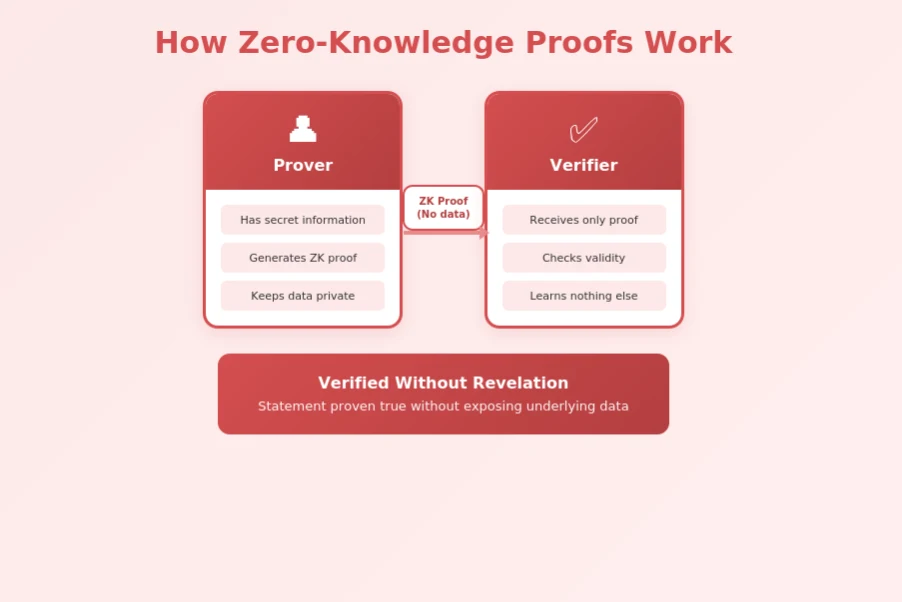
Understanding how zk-Cryptography functions reveals why it’s so powerful for Web3 applications. The mathematics involves complex polynomial commitments and algebraic circuits, but the concepts can be understood without deep mathematical background.
Understanding zk-SNARKs and zk-STARKs
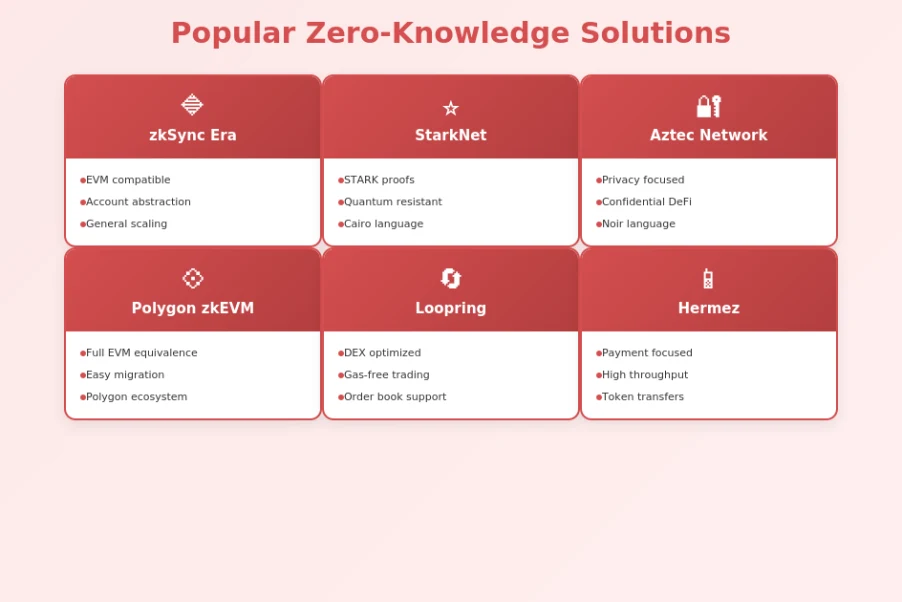
zk-SNARKs (Succinct Non-interactive Arguments of Knowledge) are the most widely deployed zero-knowledge proof system. They’re “succinct” because proofs are small (a few hundred bytes), “non-interactive” because the prover generates a proof without back-and-forth communication, and “arguments of knowledge” because they prove the prover actually knows the underlying data.
zk-SNARKs require a “trusted setup” phase that generates cryptographic parameters. If the setup is compromised, fake proofs could be created. Multi-party computation ceremonies mitigate this risk but don’t eliminate it entirely. Despite this limitation, zk-SNARKs power major protocols because their tiny proofs are cheap to verify on-chain.
zk-STARKs (Scalable Transparent Arguments of Knowledge) eliminate the trusted setup requirement through “transparent” construction based on hash functions. They’re also quantum-resistant since they don’t rely on elliptic curve cryptography. The tradeoff is larger proof sizes (tens to hundreds of kilobytes) and longer verification times. StarkNet and similar platforms use zk-STARKs for maximum trustlessness.
Non-Interactive Zero-Knowledge Proofs (NIZK)
Non-Interactive Zero-Knowledge Proofs are essential for blockchain applications because they don’t require live interaction between prover and verifier. A prover generates a proof once, and anyone can verify it at any time using only the proof and public parameters. This enables asynchronous verification that fits blockchain’s architecture.
The Fiat-Shamir transformation converts interactive proofs to non-interactive ones by using a hash function to generate challenges deterministically. This technique underlies most practical ZK systems. Zero-Knowledge SDKs abstract these complexities, letting builders focus on application logic rather than cryptographic primitives.
Benefits of Zero-Knowledge Technology in Web3
Zero-Knowledge Technology delivers concrete benefits that address fundamental blockchain limitations. Understanding these advantages helps evaluate where ZK solutions make sense.
Enhancing Privacy and Security in Blockchain
Public blockchains expose all transaction data by default, creating privacy concerns for individuals and businesses. ZK Privacy Protocols enable selective disclosure where users prove only what’s necessary. A trader can prove they’re authorized without revealing their identity. A business can prove regulatory compliance without exposing customer data.
Security improves because less data is exposed. When transaction details remain private, attackers have less information to exploit. Front-running becomes harder when transaction intentions aren’t visible in the mempool. The reduced attack surface complements other security measures.
Reducing Gas Fees and Network Load
zk-Scalability Solutions dramatically reduce on-chain costs by compressing verification. Instead of paying gas to process each transaction individually, a ZK-Rollup batches hundreds or thousands of transactions and generates a single proof. The main chain only needs to verify this proof, spreading the verification cost across all batched transactions.
This compression can reduce costs by 10-100x depending on the specific implementation and transaction types. For applications with high transaction volumes, these savings transform economic viability. Users who previously couldn’t afford frequent transactions can now participate meaningfully.
Enabling Faster Transaction Verification
ZK proofs enable faster verification because checking a proof is computationally cheaper than re-executing the computation it attests to. A proof that a batch of 10,000 transactions is valid can be verified in milliseconds, while checking each transaction individually would take significantly longer.
| Benefit | Without ZK | With ZK Technology |
|---|---|---|
| Transaction Privacy | All details public | Selective disclosure |
| Gas Costs | $5-50 per transaction | $0.05-0.50 per transaction |
| Throughput | 15-30 TPS on Ethereum | 2,000+ TPS on ZK-Rollups |
| Compliance Privacy | Expose all data | Prove without revealing |
Popular Zero-Knowledge Solutions
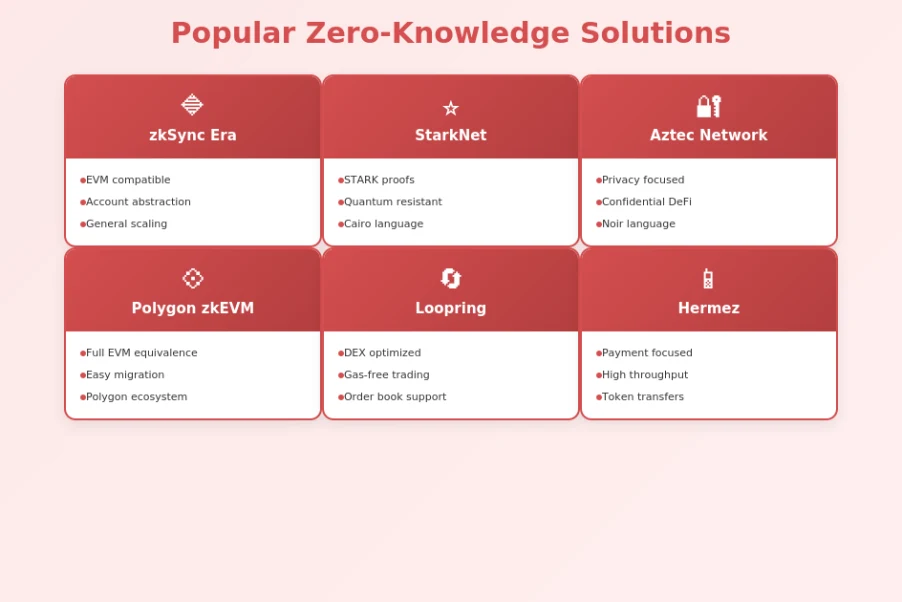
The ZK-Enabled Web3 Platforms ecosystem has grown substantially, with multiple production-ready solutions serving different needs. Understanding the landscape helps builders choose appropriate infrastructure.
zkSync 2.0 – Scaling Ethereum with ZK-Rollups
zkSync, built by Matter Labs, is one of the leading ZK-Rollups offering Ethereum scaling with native account abstraction. zkSync Era (2.0) provides full EVM compatibility through a custom compiler, letting developers deploy Solidity contracts with minimal changes. The platform processes thousands of transactions per second at a fraction of Ethereum mainnet costs.
StarkNet – ZK-Rollup Solution for High-Speed Transactions
StarkNet, built by StarkWare, uses zk-STARKs for trustless, quantum-resistant proofs. It employs Cairo, a purpose-built language optimized for generating STARK proofs. While the learning curve is steeper than EVM-compatible options, StarkNet offers unique capabilities including recursive proofs and superior long-term security properties.
Aztec Network – Privacy-Focused ZK Protocol
Aztec Network focuses specifically on privacy, enabling confidential transactions on Ethereum. Unlike scaling-focused rollups, Aztec prioritizes hiding transaction details including amounts and participants. The protocol uses PLONK proofs and supports programmable privacy through its Noir language. Aztec represents ZK Privacy Protocols at their most sophisticated.
zkEVM by Polygon – Ethereum-Compatible ZK Solution
Polygon zkEVM provides full Ethereum Virtual Machine equivalence, meaning existing contracts can deploy without any modifications. This ZK-EVM Infrastructure lowers the barrier for teams already building on Ethereum. The protocol uses PLONK-based proofs and benefits from Polygon’s broader ecosystem and resources.
Loopring – ZK-Rollup for Decentralized Exchanges
Loopring pioneered ZK-Rollups for trading applications, optimizing specifically for order book exchanges and AMM swaps. The protocol enables gas-free trading with Ethereum security guarantees. Teams building comprehensive trading platforms often study Loopring’s architecture for ZK exchange implementation.
Hermez Network – Efficient ZK Payments and Transfers
Hermez (now part of Polygon) focused on efficient token transfers and payments. The protocol optimized for simple operations like sends and swaps, achieving very high throughput for these common use cases. Its approach demonstrates how specialized ZK circuits can outperform general-purpose solutions for specific applications.
| Solution | Proof System | EVM Compatible | Primary Focus |
|---|---|---|---|
| zkSync Era | PLONK (SNARK) | Yes (compiler) | General scaling |
| StarkNet | STARK | Via Kakarot | Trustless scaling |
| Aztec | PLONK (SNARK) | No (Noir lang) | Privacy |
| Polygon zkEVM | PLONK (SNARK) | Full equivalence | Compatibility |
| Loopring | Groth16 (SNARK) | Limited | Trading |
Use Cases of Zero-Knowledge Technology
ZK-Driven dApp Frameworks enable applications that weren’t possible before ZK maturity. These use cases demonstrate practical value creation through zero-knowledge cryptography.
Privacy-Focused DeFi Applications
DeFi typically exposes all financial activity publicly, creating privacy concerns and enabling exploitation like front-running. ZK-enabled DeFi allows private trading, confidential lending positions, and hidden portfolio balances while still proving protocol rules are followed. Users can participate in DeFi without broadcasting their financial activity to competitors and attackers.
Enterprise ZK Compliance becomes possible when organizations can prove they meet regulatory requirements without exposing customer data. A fund can prove it only accepts accredited investors without revealing investor identities to the public blockchain.
Secure Identity Verification on Web3
Identity verification typically requires revealing sensitive personal information. Zero-Knowledge enables proving identity claims without exposure: proving you’re over 18 without revealing your birthdate, proving citizenship without revealing passport details, or proving credential ownership without revealing the full credential.
This selective disclosure aligns with privacy regulations like GDPR that require data minimization. Organizations can verify what they need while users maintain privacy. Zero-Knowledge Development Tools like Circom and SnarkJS enable building custom identity circuits.
Confidential Voting and Governance Systems
DAO governance typically exposes all votes publicly, potentially enabling coercion, vote buying, or strategic voting based on observing others. ZK voting allows verifiable elections where individual votes remain secret but final tallies are provably correct. Voters can prove they voted without revealing their choice.
ZK Solution Selection Criteria
- EVM Compatibility: Need existing Solidity contracts? Choose zkSync or Polygon zkEVM
- Maximum Security: Require trustless, quantum-resistant proofs? Consider StarkNet
- Privacy Focus: Need confidential transactions? Evaluate Aztec Network
- Trading Applications: Building DEX or exchange? Study Loopring’s approach
- Custom Logic: Need specialized circuits? Explore Circom or Cairo
Challenges and Limitations of ZK Technology
Despite significant advances, Zero-Knowledge Technology faces challenges that affect adoption and implementation. Understanding these limitations helps set realistic expectations.
Computational Complexity and Verification Costs
Generating ZK proofs requires substantial computation. Proving complex operations can take seconds to minutes depending on circuit complexity and hardware. While verification is fast, the proving cost affects user experience and requires either client-side computation or proving infrastructure.
Specialized hardware (GPUs, FPGAs, custom ASICs) accelerates proof generation but adds infrastructure complexity. The computational demands also translate to energy consumption that varies by proof system and implementation.
Integration Challenges with Existing Blockchain Networks
Integrating ZK technology with existing systems requires careful engineering. Different virtual machines, programming languages, and data structures create compatibility challenges. Even “EVM-compatible” solutions have edge cases that require adaptation. Teams need specialized knowledge to build and audit ZK systems effectively.
Future Opportunities and Improvements in ZK Technology
The ZK field evolves rapidly. Proof systems continue improving with smaller proofs, faster generation, and better security properties. Hardware acceleration is advancing. Developer tooling is becoming more accessible. These improvements suggest current limitations will diminish over time as the technology matures.
| Phase | Stage | Activities | Outcome |
|---|---|---|---|
| 1 | Requirements | Define privacy and scaling needs | Specification |
| 2 | Selection | Choose ZK solution or build custom | Platform choice |
| 3 | Implementation | Build circuits or deploy contracts | Working system |
| 4 | Audit | Security review of circuits and contracts | Verified code |
| 5 | Deployment | Launch with proving infrastructure | Production system |
Conclusion
Zero-Knowledge Technology represents one of the most significant cryptographic advances in blockchain’s evolution. By enabling verification without revelation, ZK proofs address fundamental tensions between transparency, privacy, and scalability that have limited Web3 adoption.
The Growing Role of Zero-Knowledge Technology in Web3
Zero-Knowledge in Web3 solutions has transitioned from theoretical cryptography to production infrastructure. Major protocols secure billions in value. Layer 2 solutions process millions of transactions. Privacy applications enable new categories of confidential finance. The technology’s role will only grow as implementations mature and costs decrease.
The convergence of scaling and privacy through ZK creates infrastructure that can serve mainstream users expecting both performance and confidentiality. This dual capability positions Zero-Knowledge Technology as essential Web3 infrastructure rather than niche tooling. Teams building professional digital asset platforms increasingly view ZK integration as a competitive necessity.
Key Takeaways for Builders and Enterprises
For builders, Zero-Knowledge Development Tools have become accessible enough for production use. Choosing between existing platforms (for faster deployment) or custom circuits (for specific requirements) depends on project needs. EVM compatibility from zkSync and Polygon zkEVM lowers migration barriers for existing applications.
For enterprises, Enterprise ZK Compliance offers the ability to participate in blockchain systems while meeting regulatory obligations. Private transactions, confidential computations, and verifiable credentials enable business processes that public transparency would prohibit. Teams building complete exchange and trading infrastructure integrate ZK for privacy-preserving compliance and scalable settlement.
Build ZK-Powered Solutions
Implement Zero-Knowledge technology for privacy and scalability with expert guidance.
Zero-Knowledge Technology has evolved from academic research to essential Web3 infrastructure. Whether enabling private transactions, scaling throughput, or proving compliance without data exposure, ZK proofs solve problems that have limited blockchain adoption. As the ecosystem matures with better tooling, improved performance, and wider integration, Zero-Knowledge will become as fundamental to Web3 as encryption is to the internet.
Frequently Asked Questions
Zero-Knowledge Technology is a cryptographic method that allows one party to prove they know something without revealing what that something is. In blockchain, it enables transaction validation without exposing sensitive data like amounts, addresses, or identities. This technology powers privacy-preserving applications and scalable Layer 2 solutions across the Web3 ecosystem.
Zero-Knowledge enables true privacy on public blockchains where all transactions are normally visible. Users can prove they have sufficient funds, meet requirements, or own assets without revealing balances, identities, or transaction details. This privacy is essential for mainstream adoption where users expect confidentiality similar to traditional financial systems.
ZK-Rollups are Layer 2 scaling solutions that process transactions off-chain and post validity proofs to Ethereum. Instead of verifying every transaction, Ethereum only needs to verify the proof, dramatically reducing costs and increasing throughput. Popular ZK-Rollups include zkSync, StarkNet, and Polygon zkEVM, offering 10-100x cost reduction.
Zero-Knowledge Technology enhances security by minimizing data exposure, meaning there’s less sensitive information to steal. It enables verification without revealing details that could be exploited. However, ZK systems still require secure implementation, and the underlying smart contracts remain vulnerable if poorly coded.
Businesses can implement ZK through several approaches: deploying on existing ZK-Rollups like zkSync or StarkNet for scaling, integrating ZK privacy features using SDKs like Aztec’s, or building custom ZK circuits for specific verification needs. The choice depends on requirements around privacy, scalability, compatibility, and technical complexity.
Reviewed & Edited By

Aman Vaths
Founder of Nadcab Labs
Aman Vaths is the Founder & CTO of Nadcab Labs, a global digital engineering company delivering enterprise-grade solutions across AI, Web3, Blockchain, Big Data, Cloud, Cybersecurity, and Modern Application Development. With deep technical leadership and product innovation experience, Aman has positioned Nadcab Labs as one of the most advanced engineering companies driving the next era of intelligent, secure, and scalable software systems. Under his leadership, Nadcab Labs has built 2,000+ global projects across sectors including fintech, banking, healthcare, real estate, logistics, gaming, manufacturing, and next-generation DePIN networks. Aman’s strength lies in architecting high-performance systems, end-to-end platform engineering, and designing enterprise solutions that operate at global scale.
